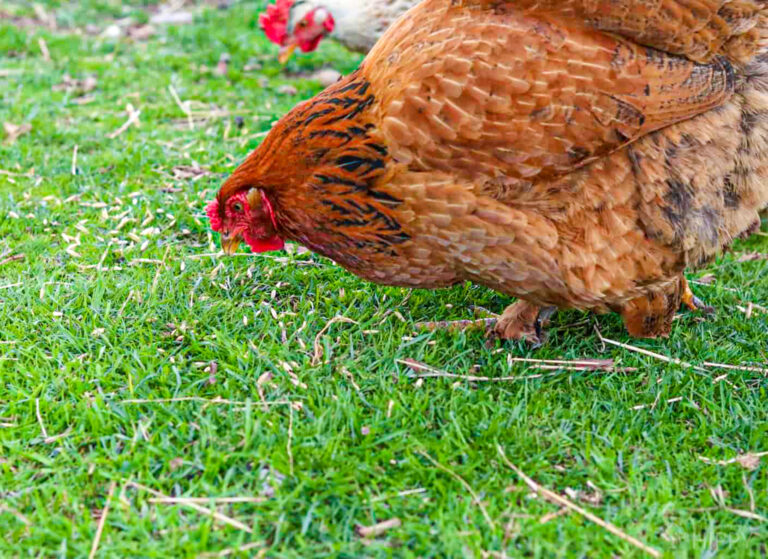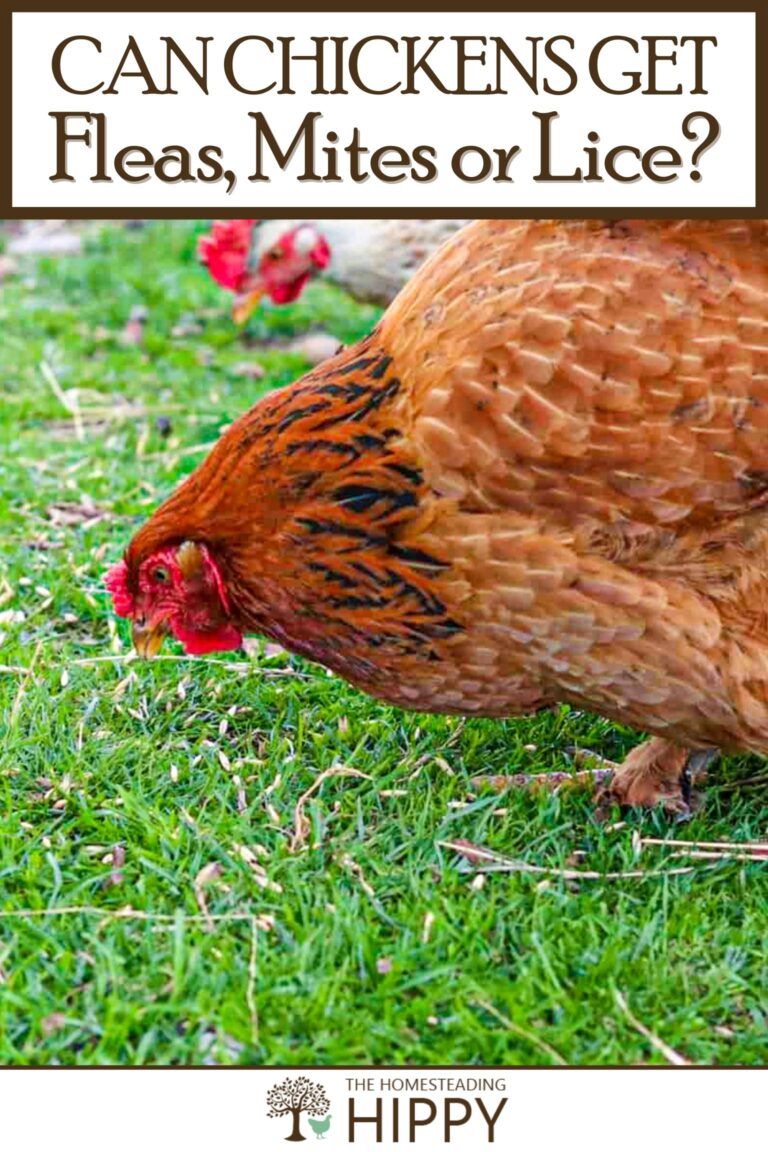Chickens are thought to be hardy and easy to care for, and much of the time they are, at least compared to mammals.

However, some chicken owners might not consider that their feathered friends can fall victim to a number of parasites, the same as larger livestock.
You’ll rarely hear of this discussion among prospective owners. So, can chickens get fleas, mites, or lice?
Yes, chickens can get fleas, mites, or lice just like other animals. Infestations can spread quickly as the insects feed on your chickens’ blood, and lay eggs in their feathers.
The best way to prevent and treat these pests is by inspecting your chickens regularly, using appropriate pesticides when called for, and ensuring that their coop is clean at all times.
Sadly, chickens are seen as hosts for several different types of parasites, including mites, lice, and fleas. However, even though these parasites can be found on chickens, they don’t have to cause major issues.
With regular care and attention, you will be able to keep your chickens safe from the predations of fleas, mites, and lice. We’ll tell you what you need to know in the rest of this article.
What Kinds of Fleas, Mites, and Lice Prey on Chickens?
There is a disturbingly huge amount of variety among the parasite species on earth, and as it turns out quite a few of them are more than happy to dine on your poor chickens.
Fleas, mites, and lice are all among the most common parasites that can infect your birds.
Fleas
Fleas are small, wingless insects that feed on the blood of their host. Chickens can be infected by different flea species, but the most common and troublesome is the sticktight flea.
This type of flea attaches itself to the skin of its host, often on the head and face, making them difficult to remove. They are also heavy feeders, and can cause anemia in adult chickens r even the death of chicks!
Mites
Mites are small arthropods that also live off of the blood of their host. Chickens can be infected with a wide variety of different mite species, but the most common is the northern fowl mite.
These mites are most active at night, and as bloodsuckers, they can also cause anemia or death in chickens if left unchecked. You need to check your chickens regularly and take action in preventing a mite infestation.
Lice
Lice are small insects that feed on the feathers and skin of their host. Lice are nearly as numerous as fleas, but the most common is the chicken body louse.
Lice infestations can cause loss of feathers and brown spots on a chicken’s skin. The stress of infection often results in decreased egg-laying.
No matter what species of parasite you are dealing with, you must eliminate them to save your flock.
What Are the Signs That Your Chickens Have a Parasite Infestation?
There are several key signs that can indicate that your chickens may be suffering from a parasite infestation.
First, you may notice that they are losing weight or becoming lethargic. This could be a sign of a weakened immune system due to the presence of harmful parasites like lice and mites.
In addition, your chickens may develop bald spots on their skin or unusually small or weakly rooted feathers, which indicates that parasites are feeding either on their blood or the feather directly.
Another telltale sign is the presence of droppings in unusual places; for example, if you notice that your birds have left droppings around their food or water bowls, this could be a signal that they have been substantially weakened by the ravages of parasites.
One of the most obvious, yet difficult to spot, signs of an infestation is a visual confirmation of the little buggers. Using a magnifying glass, you may be able to see mites crawling on the skin of your birds.
Similarly, fleas can be spotted with the naked eye if they are adult and embedded on the exposed flesh of your bird. Look near their combs, eyes, and wattles for small, flat brown bugs.
Finally, one last symptom of a raging infestation is an abnormal odor in the chicken coop; if it starts to smell musty or rancid, it may be an indication that harmful organisms such as lice and mites have bred out of control and taken up residence in your flock’s living space.
These are just some of the signs to look out for if you suspect that your chickens are dealing with a parasite infestation. If you detect any of them, it is time to take action as soon as possible.
How Can You Prevent an Infestation of These Parasites in Your Flock?
The best way to guard against infestations is to regularly check your chickens for signs of parasites. They are far easier to deal with before the whole flock is infected and the parasites have multiplied into a horde.
Pay special attention to areas like the base of their tails, around the eyes, their vents or under their wings where these pests are most likely to congregate.
Take note if you see dark specks on a chicken’s feathers or skin that may indicate a parasite infestation.
Additionally, watch out for any signs of weight loss or lethargy in the flock as these symptoms may indicate infection from parasites. Also, take any measures necessary to prevent rodents from accessing your coop.
You are likely already familiar with such strategies if you a veteran chicken owner. But aside from stealing eggs and chicks rats and mice are notorious carriers of fleas, fleas that will happily infest your coop.
One last thing: remember that a healthy flock is much more resilient against parasites than an unhealthy one, so make sure you are providing your birds with high-quality nutrition and plenty of fresh water at all times.
Overall, maintaining a clean environment and regularly checking chickens for parasites are key steps in preventing an infestation from taking hold or going out of control.
How Can You Treat an Infestation?
Sometimes, no matter how hard you work and how careful you are, you chickens are going to fall prey to parasites.
Maybe the flock is ate up with them, or maybe the coop is swarming with eggs and young. Neither is acceptable. Time to do something about it.
Some options include using medicated shampoos and sprays that are designed specifically for this purpose that will help soothe your ailing birds while driving away parasites.
Another option that is more appropriate to serious infestation is subjecting affected chickens to a dip in specialty insecticide baths.
Be sure to thoroughly cover all areas of the body, including under the wings and around the vent. If possible, repeat this treatment several times during the infestation in order to ensure total eradication.
You’ll also have to clean out their coop and other occupied areas. It’s the only way to be free of the parasite menace, whatever it is.
The first step in eradicating an infestation from the coop is to clean it out. Begin by removing all bedding and other debris from the coop. Next, wash down the entire interior of the coop using soap and water.
Once the coop has been completely cleaned, you can begin to administer insecticide.
There are many different types of insecticide available, ranging from natural products like apple cider vinegar and diatomaceous earth to more potent lab-formulated solutions.
Whichever you choose, be sure to follow all instructions for application carefully to ensure that it is effective against parasites.
During this time you’ll need to remove the chickens, and when you do they should be quarantined from other birds and livestock until they have been fully screened for parasites and the coop is disinfected.
Chickens Are Vulnerable to Fleas, Mites and Lice
Chickens are unfortunately vulnerable to a number of common parasites, including fleas, mites and lice.
Maintaining a clean environment and regularly checking chickens for parasites are essential to preventing an infestation from harming your flock.
If you do find that your flock has fallen victim, quick action in treatment and eradication efforts is called for.

Tom has built and remodeled homes, generated his own electricity, grown his own food and more, all in quest of remaining as independent of society as possible. Now he shares his experiences and hard-earned lessons with readers around the country.
Find out more about the team here.
